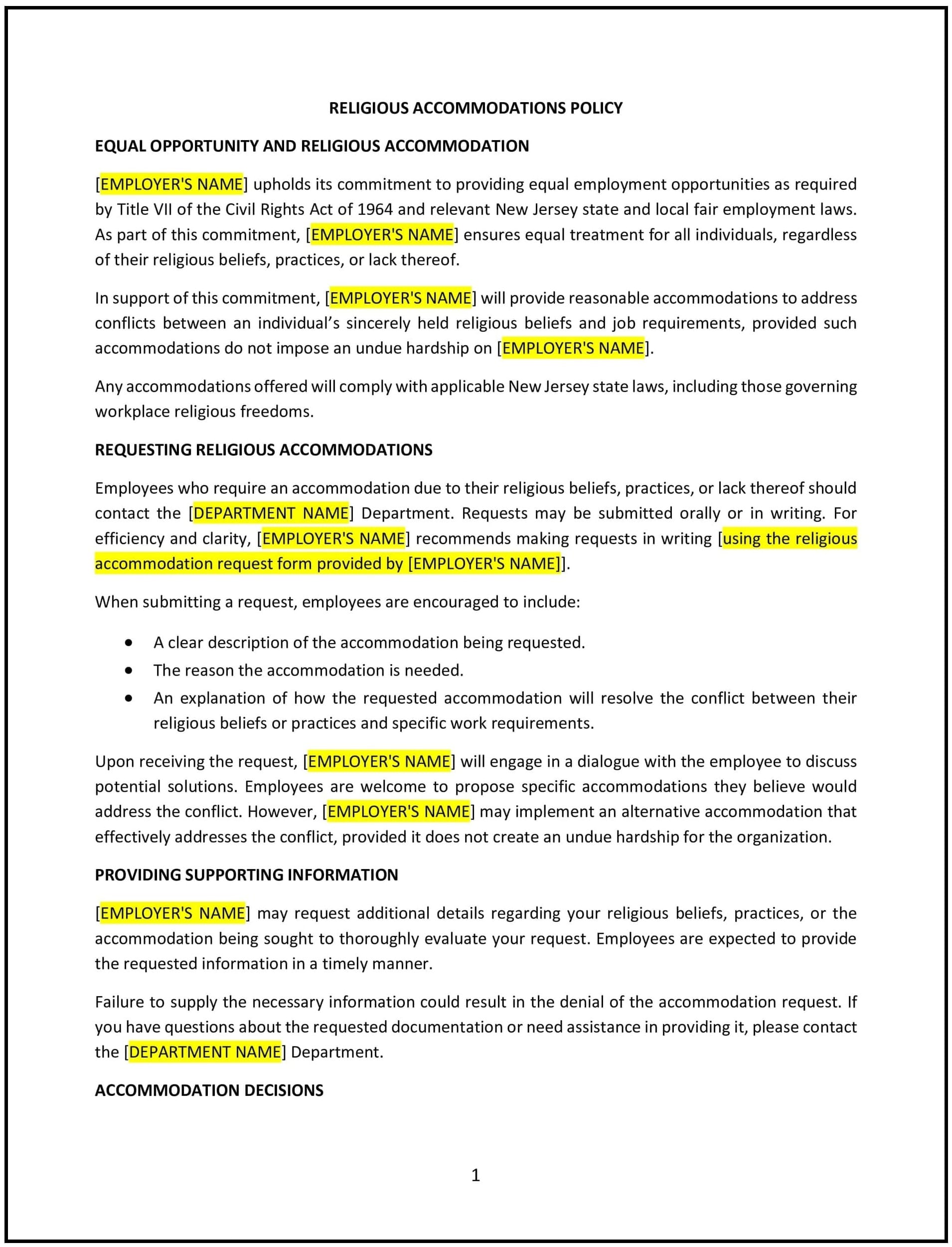Religious accommodations policy (New Jersey): Free template
Got contracts to review? While you're here for policies, let Cobrief make contract review effortless—start your free review now.

Customize this template for free
Religious accommodations policy (New Jersey)
A religious accommodations policy helps New Jersey businesses support employees' rights to practice their religion by providing reasonable accommodations for religious observances. This policy outlines how the company will handle requests for time off, flexible schedules, or other adjustments related to religious practices, while balancing the operational needs of the business.
By adopting this policy, businesses in New Jersey can create a more inclusive and supportive workplace, promote equal opportunity, and help employees feel respected and valued.
How to use this religious accommodations policy (New Jersey)
- Define the scope of religious accommodations: Specify the types of accommodations that may be requested, such as time off for religious holidays, flexible work hours for prayer, or modifications to dress code requirements.
- Establish a process for requesting accommodations: Require employees to submit formal requests for religious accommodations, specifying the nature of their religious observance and the accommodations needed.
- Set guidelines for approving requests: Ensure that the process for granting accommodations is clear, fair, and timely, while considering the impact on business operations.
- Address undue hardship: Clarify what constitutes an undue hardship for the business and how this may impact the ability to grant a requested accommodation (e.g., operational impact, cost, or safety concerns).
- Provide alternatives when necessary: If a requested accommodation cannot be provided, offer reasonable alternatives, such as adjusted scheduling or alternative work arrangements.
- Ensure non-discrimination: Reinforce that religious accommodations will be provided without discrimination, and employees will not face retaliation for requesting accommodations.
- Review and update: Regularly assess the policy to ensure it aligns with New Jersey state law, federal regulations, and company practices.
Benefits of using this religious accommodations policy (New Jersey)
This policy provides several benefits for New Jersey businesses:
- Promotes inclusivity: Helps create a more inclusive workplace by respecting employees' religious practices and beliefs.
- Reduces legal risks: Minimizes the risk of religious discrimination claims by ensuring that employees’ religious needs are fairly considered and accommodated.
- Enhances employee morale: Shows employees that their religious rights are respected, fostering a positive and supportive work environment.
- Improves retention: Supports employee retention by accommodating the diverse needs of the workforce, including religious observances.
- Strengthens company reputation: Demonstrates the company's commitment to diversity and respect for employee rights.
Tips for using this religious accommodations policy (New Jersey)
- Communicate the policy clearly: Ensure that all employees are aware of the process for requesting religious accommodations and the types of accommodations available.
- Provide training to managers: Educate managers on how to handle requests for religious accommodations and address any potential challenges in an objective and respectful manner.
- Be flexible: Consider each request on a case-by-case basis, and be open to alternative solutions if the original request cannot be fully accommodated.
- Document requests and approvals: Keep a record of religious accommodation requests and the outcomes to ensure consistency and transparency.
- Review the policy regularly: Update the policy to reflect changes in New Jersey regulations, best practices, and employee needs.